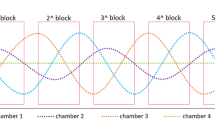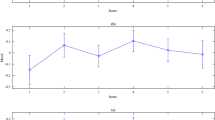Abstract
EXPERIMENTAL studies of the effects of ambient temperatures on simple reaction time have suggested that there may be a negative correlation between simple reaction time and temperature, but results appeared to be rather inconclusive. In fact Teichner1, in a review of studies of simple reaction time, concludes that ambient temperatures between − 50° and 117° F. have little or no effect on either simple reaction time or more complex reaction times.
This is a preview of subscription content, access via your institution
Access options
Subscribe to this journal
Receive 51 print issues and online access
$199.00 per year
only $3.90 per issue
Buy this article
- Purchase on Springer Link
- Instant access to full article PDF
Prices may be subject to local taxes which are calculated during checkout
Similar content being viewed by others
References
Teichner, W. H., Psych. Bull., 51, 2 (1954).
Fraser, D. C., in National Coal Board Medical Research Memorandum No. 1 (1955).
Author information
Authors and Affiliations
Rights and permissions
About this article
Cite this article
FRASER, D., JACKSON, K. Effect of Heat Stress on Serial Reaction Time in Man. Nature 176, 976–977 (1955). https://doi.org/10.1038/176976b0
Issue Date:
DOI: https://doi.org/10.1038/176976b0
This article is cited by
Comments
By submitting a comment you agree to abide by our Terms and Community Guidelines. If you find something abusive or that does not comply with our terms or guidelines please flag it as inappropriate.



